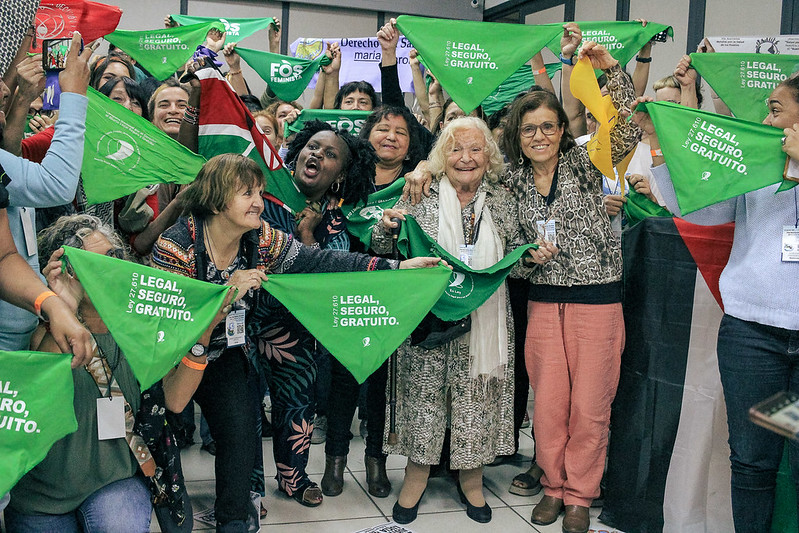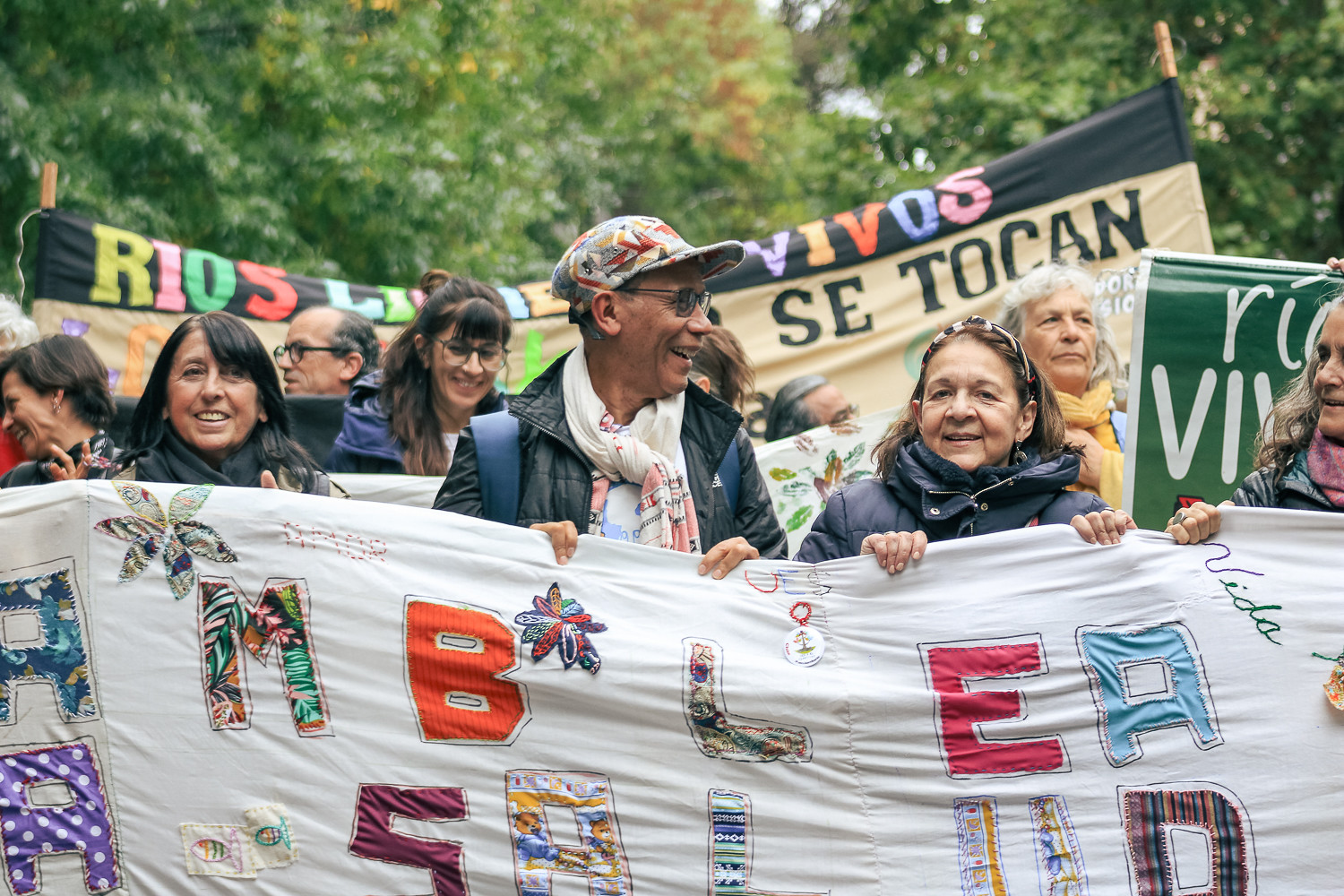The struggles for public health came to a head in Mar del Plata
At the 5th People’s Health Assembly, international social movements came together to debate ways of guaranteeing health for all. It was an important moment to unite voices against inequalities, the privatization of knowledge and war.
by Gabriela Leite , OutraSaúde, special for PHM
Article originally published in Outra Saúde in https://outraspalavras.net/outrasaude/as-lutas-pela-saude-publica-desaguaram-em-mar-del-plata/
Every year, in Geneva, countries gather at a World Health Organization (WHO) event to debate the present and future of health. But the struggles of the Global South are repeatedly left in the background, behind the interests of the United States and Europe, as well as those of large corporations. Keeping in mind the scale, another event, small and combative, served as a counterpoint to that of the establishment. It was the 5th People’s Health Assembly, which took place early April 2024 in the coastal city of Mar del Plata, Argentina.
The Assembly is organized by the People’s Health Movement (PHM), a network of social movements, especially those from countries on the periphery of capitalism, which are active around the world in the fight for Health for All. The PHM was born out of the revolt at the fact that the world was moving away from the paradigms launched at the 1978 World Health Organization (WHO) Conference, and signed in the well-known Declaration of Alma-Ata. But the Mar del Plata meeting was the first after the Covid-19 pandemic. The consequences of this crisis were on the event's agenda - but the perception is that the core causes of health inequalities go back much further.
This is what Colombian Román Vega, global coordinator of the PHM, analyzes in an interview with Outra Saúde. In his opinion, the central reasons for the prolonged public health problems are twofold: "Extractive, transnational capitalism and the forces of a global imperial center block the achievement of Health for All through different procedures and strategies".
For Román, the phenomena of the financialization of the economy have led to the ecological crisis we are experiencing. "Just as they have been privatizing and commercializing health services and destroying the dynamics of people's food sovereignty, through intensive agro-industry, monocultures, the destruction of forests, waters and biodiversity as a whole."
As a counterpoint to this dynamic, more than 600 activists from over 60 countries met in Mar del Plata, in a complicated political context in Argentina - which is currently under the ultra-liberal government of Javier Milei. "It was a very combative, supportive, hopeful and inspiring assembly. I think these four words sum up the feelings of those who consider the event a success," Román celebrated.
The role of Latin America
The movement originated in Bangladesh, and the influence of Indian activists has been strong in its trajectory. But with the leadership of Román Vega, PHM has been expanding and strengthening in Latin America. "The majority presence at the Assembly was of activists from almost all Latin American countries, diverse in terms of cultural and social background," he said. And the arrival of the fight for Health for All on this side of the world has brought new contributions.
"For example," Román said, "the agroecological movement in Latin America has consolidated a strong alliance and presence. It helps us see the implications of extractivism for agricultural processes and food sovereignty, as well as building common agroecological strategies to confront the poisoning of waters, the destruction of living beings by agrotoxins, the control of fertilizer and seed transnationals, etc."
Another important Latin American contribution came from the social and solidarity economy movement. According to Román, there is an effort to create the University of “Buen Vivir”, "as an interdisciplinary and transdisciplinary process that helps us to understand the conditions for an ecologically sustainable world". His speech helps us understand another important concept discussed at the Assembly: that of One Health - in other words, the recognition that human health is intrinsically linked to animal health and the environment.
Solidarity with the Palestinian people
One concern was present during the production and running of the event. The representatives of PHM Palestine were unable to get to Argentina, prevented by the war that the Israeli government is imposing on their territory. The hearts and minds of the activists present at the Assembly did not allow the horror taking place in Gaza today to be forgotten.
The Palestinian representatives wrote a letter to the participants in Mar del Plata. They say: "We remind you that, for us, Health for All must challenge the dominant powers that conspire and compromise to continue the genocide in Palestine for the benefit of their own interests. The unjust war waged by the Israeli occupation uses hunger, thirst and the destruction of all means of subsistence as war aims".
Some of the Palestinian activists managed to participate via video call to the Assembly's tables and debates. They reaffirmed the urgency of an immediate ceasefire, denounced the attacks on humanitarian aid and called for an end to the occupation. Román Vega said: "It was a challenge for us to be able to express our deep solidarity with the Palestinian people in Argentina, a country allied with the United States and Israel."
Medicines: megacorporations block the right to health
In a financialized world, where science works to strengthen megacorporations, is it possible to guarantee Health for All? Another central theme of the Assembly was access to medicines and vaccines.
Susana van der Ploeg, lawyer and coordinator of the Working Group on Intellectual Property of the Brazilian Network for the Integration of Peoples (Rebrip), explains that they "have a direct impact on the price, accessibility and sustainability of public health systems, as well as on families and consumers themselves". According to Susana, this "impacts not only on the health sovereignty of countries, but on the food sovereignty of peoples, based on the appropriation of their knowledge". For her, the PHM event demonstrated the need to share knowledge - in the opposite direction to transnational industries.
"This is what the patent system prevents: the exchange of knowledge through its privatization," Susana argues. "All this within a colonial structure that persists and remains based on racism, exploiting the 'lives that don't matter'." Susana cites the proposal of the Mar del Plata Declaration, organized by the Latin American Network for Access to Medicines (RedLAM), as a possible alternative. During the event, organizations debated and signed the document, which advocates excluding health from World Trade Organization (WTO) agreements.
Its main demands: "(i) Strengthen public health systems in the region; (ii) Ensure equitable access to methods and supplies for diagnosis, prevention and treatment of diseases as public goods; (iii) Promote research and development of new health technologies independently of the market, in the exercise of health sovereignty."

Green Scarves (Pañuelos verdes): Argentine feminism and health
A major Argentine contribution to social struggles has been made by the Argentine feminist movement, which a few years ago won the right to legal abortion in their country. The green scarves (or pañuelos) worn by Argentinian women have become a global symbol of the fight for the right to terminate a pregnancy, a serious public health issue and proof of how patriarchy is still determined to control women's bodies.
Now, the right won by the Argentinian women is under attack by the Milei government - and they stood up against it during the Assembly. But other Latin American women broadened the debate to include serious women's health issues. Among them, obstetric violence and feminicide - which, as the figures show, also have a strong component of racism interspersed. Hence the importance of uniting regional and global struggles. The chant "Latin America will be all feminist" echoed through the corridors...
What to expect from the WHO's annual event
The World Health Organization is about to hold another edition of its World Health Assembly in Geneva in May. It would be an extremely important moment for the demands debated at the PHM’s Assembly to spread and turn into real changes, starting with the policies of the member states. But there is almost no hope of this happening, reflects Román Vega.
"We all know that the WHO is largely captured by the richest countries, particularly the United States, which is the main funder of the Organization," he says. "But also by the so-called philanthrocapitalism practiced by transnational corporations. This capture prevents important decisions discussed in the Assembly, such as the Pandemic Treaty, for example, from being limited in their scope by these interests of transnational capitalism."
Even so, the PHM will be present, as it does every year - although it is not optimistic that there will be radical changes. "We will add our voices to those of other platforms and alliances that we are part of. And we will say that the right to health must be guaranteed by the states, but deeply linked to the citizen participation of the people," he said.
***
"At the heart of our Assembly is the power of popular movements," said Carmen Báez, regional coordinator of the PHM at the event's opening table. "Listening to the testimonies of those at the forefront of the struggle lights a fire in our collective spirit, reminding us of the resistance and solidarity that fuel our journey towards health for all."
Román concludes: "The movement has raised the flags of ecosocialism, Buen Vivir and decolonialism. Having these banners implies not only fighting as movements, but building great regional and global alliances that allow us to have the fundamental forces to advance in the constitution of what we call 'a new international economic and political order'."


